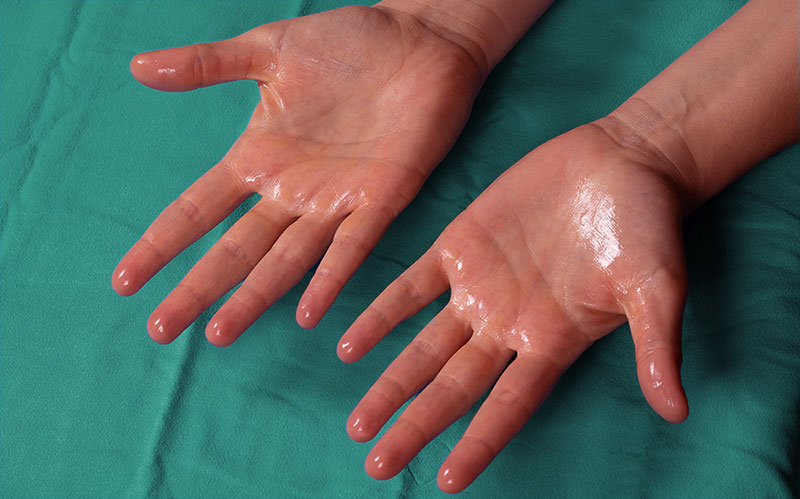How to Stop Sweaty Hands: Professional Dermatology Recommendations for Handling Excessive Sweating
How to Stop Sweaty Hands: Professional Dermatology Recommendations for Handling Excessive Sweating
Blog Article
Comprehending the Source of Excessive Sweating and Its Impact on Day-to-day Live
Too much sweating, likewise called hyperhidrosis, is a condition that impacts a substantial section of the population, yet its underlying reasons and implications on day-to-day functioning continue to be rather enigmatic. While it is typically understood as a physiological reaction to regulate body temperature, the triggers for excessive sweating can differ extensively among individuals, encompassing not only physical variables but mental and additionally emotional components. The effect of this problem extends past simple discomfort, usually affecting social communications and total high quality of life. By diving into the origin of hyperhidrosis and exploring its diverse results, a much deeper understanding of this prevalent concern can be gotten, clarifying the complexities that people grappling with extreme sweating navigate every day.
Physiology of Sweat Glands
The policy of sweat manufacturing, an important physical process, is largely controlled by the activity of sweat glands dispersed across the body. Gland are classified right into 2 major kinds: eccrine and apocrine glands. Eccrine glands are the most numerous and are found in nearly all locations of the body. They play a vital role in thermoregulation by secreting a watery liquid onto the skin's surface area, which vaporizes and aids cool the body down. On the other hand, apocrine glands are focused in locations rich in hair roots, such as the armpits and groin, and their secretions are thicker and milky in look.
When the body temperature level increases, either due to exercise, high temperature levels, or psychological stress, the nerves causes the sweat glands to produce sweat. This sweat is made up primarily of water and electrolytes like salt and chloride. The process of sweat production is necessary for preserving the body's internal temperature level within a narrow, optimum range, highlighting the vital role gland play in human physiology.
Triggers for Excessive Sweating
In recognizing the root causes of too much sweating, it is important to recognize the triggers that can lead to this physical response. Physical effort, high temperatures, and spicy foods are also understood to activate too much sweating in individuals susceptible to this problem.
In addition, medicines such as some antidepressants, opioids, and particular supplements can also act as triggers for hyperhidrosis. Comprehending these triggers is essential in managing excessive sweating effectively - Treatment for hyperhydrosis of hands. By determining and resolving the particular triggers that prompt excessive sweating in a specific, doctor can develop customized treatment strategies to reduce this problem and boost the individual's lifestyle
Medical Issue Associated
Related to extreme sweating are different clinical problems that can aggravate this physiological action. One typical condition is hyperhidrosis, a disorder identified by abnormally increased sweating that exceeds the body's thermoregulatory requirements. This can show up in focal locations like the palms, soles, underarms, or face, affecting an individual's lifestyle due to social embarrassment and discomfort.
Moreover, endocrine problems such as hyperthyroidism, diabetes mellitus, and menopausal hot flashes can also result in too much sweating. Hyperthyroidism triggers an overflow of thyroid hormonal agents, accelerating metabolic rate and setting off sweating. Diabetes can cause sweating episodes, especially during hypoglycemic episodes when blood sugar levels go down too reduced. Menopausal warm flashes, connected to hormone variations during menopause, can trigger intense and sudden sweating, often accompanied by flushing and heart palpitations.
Furthermore, infections like endocarditis, hiv, and consumption have actually been linked with night sweats, a common symptom known to interfere with sleep and influence general well-being. These medical conditions highlight the varied variety of underlying factors that can add to excessive sweating, requiring complete evaluation and administration by healthcare professionals.
Emotional and Mental Variables

Effect On Social Interactions
Extreme sweating can have profound impacts on an individual's capability to engage comfortably in social communications. The visible indications of sweat stains or wet spots on clothes can bring about humiliation and self-consciousness, creating individuals to take out from social scenarios. This withdrawal can impact relationships, restriction social tasks, and impede personal and expert growth.

Moreover, the stress and anxiety and self-worth concerns coming from extreme sweating can influence interaction and social abilities. People might struggle to concentrate on discussions, get involved in group tasks, or express themselves confidently. This can lead to sensations of seclusion and isolation, as social connections come to be challenging to maintain.
Conclusion

While it is frequently recognized as a physical response to regulate body temperature, the triggers for too much sweating can vary widely among individuals, incorporating not just physical elements however page mental and likewise psychological elements. By delving right into the origin triggers of hyperhidrosis and exploring its diverse effects, a deeper understanding of this prevalent concern can be gained, dropping light on the intricacies that individuals grappling with excessive sweating browse on a day-to-day basis.
Physical exertion, high temperatures, and spicy foods are additionally understood to activate extreme sweating in people prone to this problem. By recognizing and dealing with the details triggers that motivate extreme sweating in a specific, health care suppliers can create tailored therapy strategies to alleviate this condition and improve the person's top quality of life.
Too much sweating can have extensive results on a person's capability to engage comfortably in social interactions.
Report this page